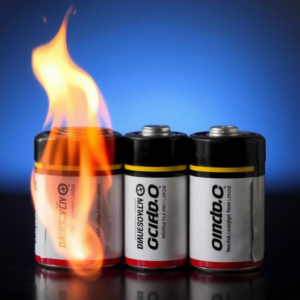Over the past few months, more incidents of fire caused by lithium-ion batteries have made it more alarming. In October 2024, officials documented 16 fires in Florida, intensified by storm surges from Hurricane Helene, which highlighted the danger of storing batteries indoors during severe weather. Similarly, in September 2024, two separate battery-related incidents in Portland triggered fires on the same day, causing families to be displaced. Apart from that, another recent example of infrastructure affected is the fire at the Ports of Los Angeles and Long Beach, which caused significant delays in operations. Collectively, these events underscore the various challenges and risks associated with the use of lithium-ion batteries across diverse environments, especially considering how easily batteries can catch on fire.
Identifying Risky Types of Batteries
Not all batteries are designed alike; some are more susceptible to catching fire than others. Understanding the different types can help you take necessary precautions.
Lithium-Ion Batteries
Lithium-ion batteries, found in many kinds of electronics, including smartphones and laptops, and even extending to electric vehicles. They have also been said to catch fire when damaged, overcharged, or exposed to high temperatures. This fact surrounds a report that came from the Consumer Product Safety Commission, citing over 25,000 cases of fires related to lithium-ion batteries between 2012 and 2017.
Alkaline Batteries
Commonly found in household items like remote controls and flashlights, alkaline batteries can leak potassium hydroxide when damaged, which is highly corrosive and can ignite under certain conditions.
Nickel-Cadmium (NiCd) Batteries
Nickel-cadmium batteries are commonly utilized in power tools and emergency lighting systems. They contain toxic metals that can cause fires if not disposed of correctly.
Tips for Preventing Battery-Related Fires at Home
Preventing battery-related fires involves a combination of proper usage, storage, and disposal practices. Here are some practical tips to keep your home safe:
Proper Usage
- Follow the Guidelines Provided by the Manufacturer: The use and charging of any type of battery should adhere to the guidelines established by the manufacturer.
- Avoid Overcharging: Chargers recommended by manufacturers should be used in order to avoid overcharging. This adds to overheating and creates a fire hazard.
- Damaged Inspection: Batteries should be periodically inspected for spreading, leaks, or corrosion.
- Immediately replace damaged batteries.
Safe Storage
- Store in a Cool, Dry Place: Keep batteries away from direct sunlight and sources of heat or moisture.
- Use Battery Cases: Store loose batteries in cases to avoid batteries touching each other that may cause a short circuit.
- Children’s Reach: Store batteries in a safe place where children will not be accidentally ingesting them inside their mouths or improperly handling the batteries.
Safe Disposal
- Recycle Batteries: It is advisable to dispose of used batteries at recommended battery disposal points. People typically dispose of these batteries easily in household trash.
- Do Not Incinerate: Never throw batteries into a fire, as they can explode and release toxic chemicals.
- Tape Terminals: For added safety, cover battery terminals with electrical tape before disposal to prevent short-circuiting.
Importance of Using High-Quality, Recommended Batteries
The risk of fire can be significantly reduced by using high-quality, recommended batteries. Cheap imitation and counterfeit batteries often lack essential safety components, leading to increased risks of battery failure and even fire. Given how easily batteries can catch on fire, it’s crucial to purchase batteries from reputable companies that offer safety certifications like UL. By choosing high-quality, safety-certified batteries, you significantly reduce the risk of dangerous incidents and ensure a safer environment for everyone.
Better Options After Fire Damage Caused by Batteries
If your home has suffered fire damage due to batteries, it’s crucial to explore your available options. One viable alternative is selling your fire-damaged property. Certain real estate companies specialize in purchasing homes affected by fire damage, enabling you to sell without the stress of extensive renovations. To attract potential buyers more quickly, consider using the phrase “fire-damaged house for sale” in your listings.
Conclusion
Battery safety is not just about protecting your devices; it’s crucial for the security of your home and loved ones. Considering the potential fire hazard and how easily batteries can catch on fire, adhering to appropriate battery safety protocols is essential in reducing the risk of indoor fires. Stay informed, select the best batteries, and engage in practices that ensure everyone’s safety. For detailed guidance, you can consult resources from the National Fire Protection Association.
Previous